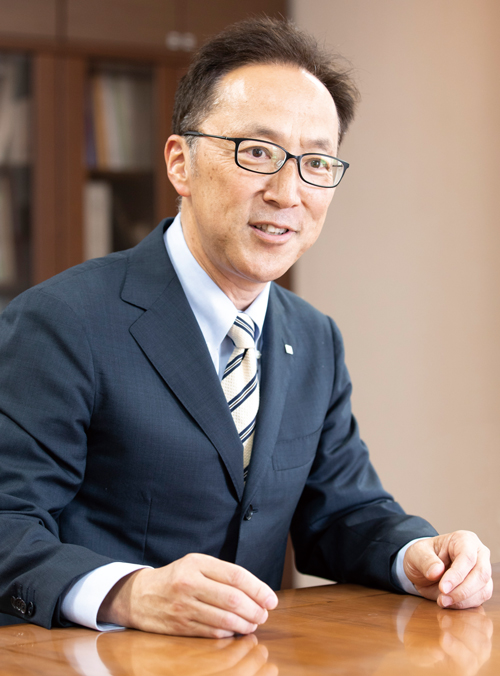About us
JAXA Aviation helps to create a safer and more prosperous society with aeronautics-related research and development activities.
FLIGHT PATH No.21 | 2018 SUMMER
<JAXA's Goals in the Fourth Mid-to-long-term Plan>
Interview with the Director General
Solid Research with a Theme That Wows
-

SANO Hisashi
Vice President/Director General
Aviation Technology Directorate - Tell us about your professional background.
Before I joined JAXA, I worked for the automobile unit of Honda Motor Co., Ltd. After spending 20 years at the Automobile R&D Center Tochigi in Utsunomiya, where I was mainly involved in research and development related to noise and vibration, I did research management for 10 years in the United States. The most memorable work I did in Tochigi was to develop a technology called “active noise control,” which involves cancelling noise with noise. It took a decade for us to realize the technology. Although it may be low-key, it’s still the world’s best technology today. In our effort to turn the technology into a product, we experienced the so-called “valley of death,” but ultimately we managed to put it to practical application.
What was your first impression of the Aviation Technology Directorate?
The first thing I noticed was how the organization was producing steady results. I was surprised by how clearly it defined its exits. Since I come from the private sector, I naturally think in terms of exit strategies, but the Aviation Technology Directorate also conducts its research based on clearly-defined exits. Another thing I found was the robustness of its technology strategy. It has a roadmap that outlines the organization’s future vision, and it has been conducting research toward that vision since the Third Mid-term Plan. Given the success so far, we will continue these activities in the Fourth Mid-to-long-term Plan.
Is there any research that you’d like to do in the future?
Research conducted by the Aviation Technology Directorate may not have the glamor of space research, but it is solid and refined―low-key, perhaps, yet valuable. I believe it might be beneficial to give our research an attractive theme with an element of surprise, one that has a wow factor. So I’d like to work on strengthening our research themes and wow the public. Actually, the Aviation Technology Directorate is already pursuing a couple of researches with that kind of theme: a quiet supersonic aircraft and an electric aircraft.
Another thing I am planning to work on is sowing the seeds of new research themes. This is also something that was started during the Third Mid-term Plan, but I would like to step up these efforts during the Fourth Mid-to-long-term Plan. It is very important to sow the seeds of research that will blossom in the future.
What’s important in managing research?
The important thing is what each staff member is thinking. Ever since I assumed the post of Director General, I’ve had extensive discussions with the management team. Going forward, I plan to visit worksites without appointment, organize discussion groups, work out countermeasures if any issue is identified, and provide backup if there isn’t any issue. My role is like that of a coxswain in rowing. As the researchers do the rowing, I will adjust the direction of the boat, regulate the rhythm of the rowers, and create an environment that facilitates the achievement of results.
What kind of goals do you want the staff of the Aviation Technology Directorate to have?
In the policy speech I delivered toward the staff members, I gave them two guiding principles to follow.
One is to “maintain youth and have a dream.” When I say “youth,” I’m not talking about a person’s age. What I mean is to always be highly receptive to new things. That will enable us to come up with new ideas. A dream also means a lofty goal. It’s extremely important to uphold a lofty goal and be determined to achieve it whatever it takes. Without this determination, you won’t accomplish anything.
The other is to “aim for the world’s top level.” This makes a pair with a lofty goal. For example, if JAXA can develop a new technology before NASA, that will energize the people of our country. It would definitely wow everyone if we manage to fly an experimental quiet supersonic aircraft using only Japanese technology. NASA has a lot of excellent researchers and a big budget, but I would like the people at JAXA to aim at surpassing NASA, instead of doing the same things as them.